 Web Front-end
Web Front-end H5 Tutorial
H5 Tutorial Many people don't know the event methods for monitoring the return, back, and previous page buttons of mobile apps and browsers such as WeChat and Alipay.
Many people don't know the event methods for monitoring the return, back, and previous page buttons of mobile apps and browsers such as WeChat and Alipay.In actual applications, we often need to click the return, back, previous page and other buttons in mobile apps and browsers to close the page, adjust to the specified page or perform some other operations
Requirement, how to monitor the event in the code when the return button of WeChat, Alipay, Baidu Nuomi, Baidu Wallet and other apps or the previous page or back button of the browser is clicked.
I believe that many friends, like me, have searched in Baidu and Sogou for a long time without finding the method. Let me tell you how to monitor:
First of all, we need to understand the history of the browser. As we all know, we can use JavaScript window history on the page to go back to the previous page. However, due to security reasons, JavaScript is not allowed to modify the existing url links in
history, but you can use the pushState method to add url links to the history. , and provide popstate event monitoring to pop up the URL from the history stack. Since popstate event
monitoring is provided, we can monitor it.
Return, back, previous page button click monitoring implementation code:
window.addEventListener("popstate", function(e) {
alert("我监听到了浏览器的返回按钮事件啦");//根据自己的需求实现自己的功能
}, false);Although we monitor the back event, the page will still return to the previous page, so we need to use pushState to add this The url of the page represents this page. Everyone knows very well that it is
#function pushHistory() {
var state = {
title: "title",
url: "#"
};
window.history.pushState(state, "title", "#");
}. When entering the page, we will push a local connection to the history. When you click on the return, backward and previous page operations, you will monitor and implement your own operations in the monitoring code.
The following is the complete code:
$(function(){
pushHistory();
window.addEventListener("popstate", function(e) {
alert("我监听到了浏览器的返回按钮事件啦");//根据自己的需求实现自己的功能
}, false);
function pushHistory() {
var state = {
title: "title",
url: "#"
};
window.history.pushState(state, "title", "#");
}
});
Note: Some codes can be found online!
Collection of follow-up questions:
1. The popstate event is triggered when entering the page in WeChat.
Solution: Define boolean variable bool=false. After the page is loaded, use the setTimeout method to set a timeout of 1.5s, and set bool=true in the timeout execution method.
Add bool judgment in popstate monitoring. When bool=true, execute the content. The specific code is as follows:
$(function(){
pushHistory();
var bool=false;
setTimeout(function(){
bool=true;
},1500);
window.addEventListener("popstate", function(e) {
if(bool)
{
alert("我监听到了浏览器的返回按钮事件啦");//根据自己的需求实现自己的功能
}
pushHistory();
}, false);
});The above is the content of the event methods for monitoring the return, back, and previous page buttons of mobile apps such as WeChat and Alipay and browsers that many people do not know. Please pay attention to more related content. PHP Chinese website (www.php.cn)!
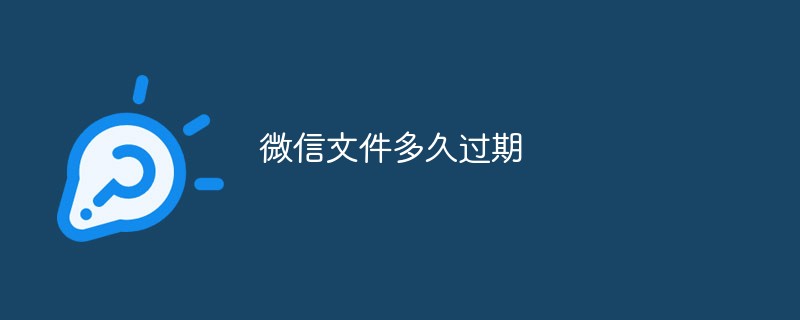 微信文件多久过期Nov 21, 2022 pm 02:12 PM
微信文件多久过期Nov 21, 2022 pm 02:12 PM微信文件的过期时间需要根据情况来判断:1、如果发送的文件没有打开过,则在72小时以后微信系统会自动清理掉,即过了三天文件就会过期;2、如果已经查看了微信文件,但是并没有下载(当然已经下载的文件也是一样的),那么文件是可以保留180天的,在这180天以内随时都可以去下载。
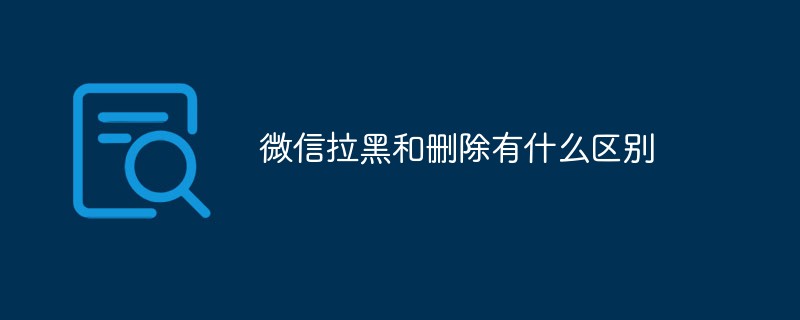 微信拉黑和删除有什么区别Oct 18, 2022 am 11:29 AM
微信拉黑和删除有什么区别Oct 18, 2022 am 11:29 AM区别:1、拉黑后对话框从主页消失,但是聊天记录还在;删除后聊天记录全部消失不见了。2、拉黑后还能发给他,但是收不到他的消息;删除后不能发信息了。3、拉黑后双方都不可见彼此的朋友圈;删除对方以后,你看不到对方的朋友圈了,对方是否能看到你的,取决于设置(允许陌生人查看十张照片)与否,如果设置则可以看到朋友圈。
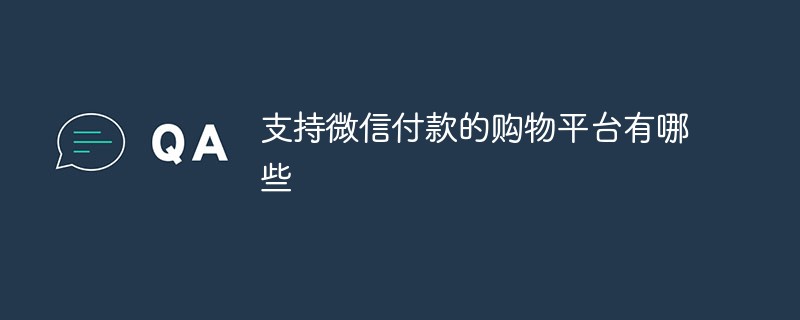 支持微信付款的购物平台有哪些Nov 02, 2022 pm 02:44 PM
支持微信付款的购物平台有哪些Nov 02, 2022 pm 02:44 PM支持微信付款的购物平台有:1、京东,是中国的综合网络零售商;2、唯品会,是一家在线销售品牌折扣商品的互联网公司;3、拼多多,是社交新电商领导者,更懂消费者的购物平台;4、京喜,是京东旗下生活消费商城;5、蘑菇街,一个电子商务网站;6、聚美优品,是一家以销售化妆品为主的时尚购物网站;7、微店,是一个云推广电子商务平台;8、考拉海购,是一个跨境海淘业务为主的会员电商平台。
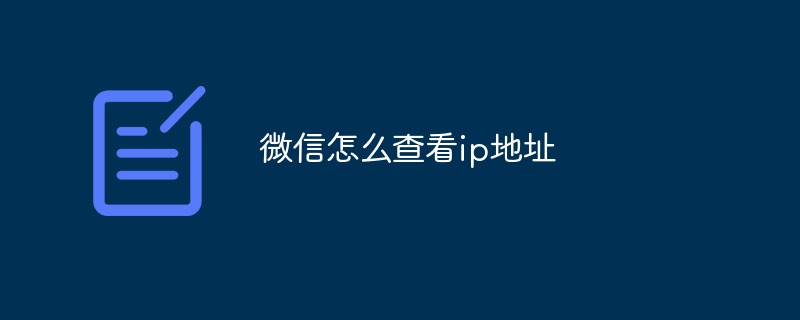 微信怎么查看ip地址May 31, 2023 am 09:16 AM
微信怎么查看ip地址May 31, 2023 am 09:16 AM微信查看ip地址的方法:1、登录电脑版微信,右键点击屏幕下方的任务栏,点击“任务管理器”;2、弹出任务管理器时,点击左下角的“详细信息”;3、任务管理器进入“性能”选项,点击“打开资源监视器”;4、选择“网络”,勾选微信进程“Wechat.exe”;5、点击下面的“TCP连接”即可监视微信网络IP相关情况,发送消息得到回复就会显示他人的IP地址。
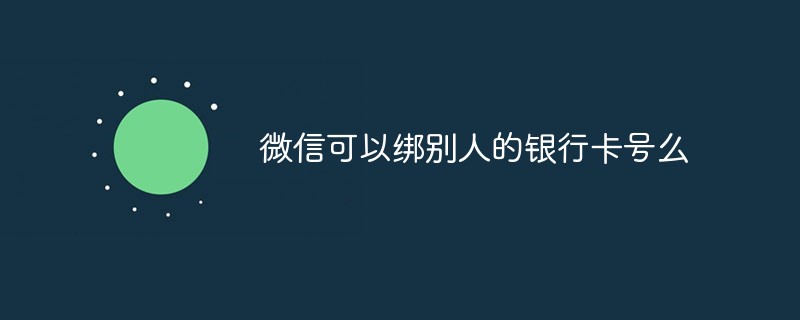 微信可以绑别人的银行卡号么Mar 14, 2023 pm 04:53 PM
微信可以绑别人的银行卡号么Mar 14, 2023 pm 04:53 PM可以。未经过实名认证的微信号,可以绑定他人的银行卡,但在绑定过程中需要提供银行卡的开户人姓名、开户行地址、开户时预留的联系方式及银行卡支付密码;已通过实名认证的微信号,无法绑定他人银行卡,只能添加使用自己身份证办理的银行卡。
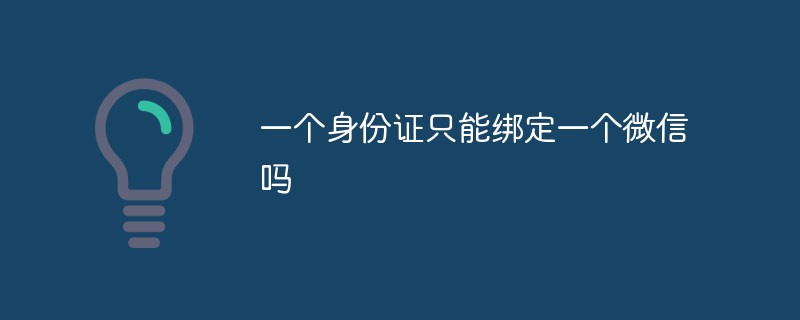 一个身份证只能绑定一个微信吗Mar 02, 2023 pm 01:50 PM
一个身份证只能绑定一个微信吗Mar 02, 2023 pm 01:50 PM不是,一个身份证能绑定5个微信。按照微信当前规定,一个身份证可以实名认证5个微信号;如果已经实名认证了5个微信账号,但是还想要继续实名,就要把已经实名认证的一些不用的微信号清除以后,才可以再实名认证新的微信号。
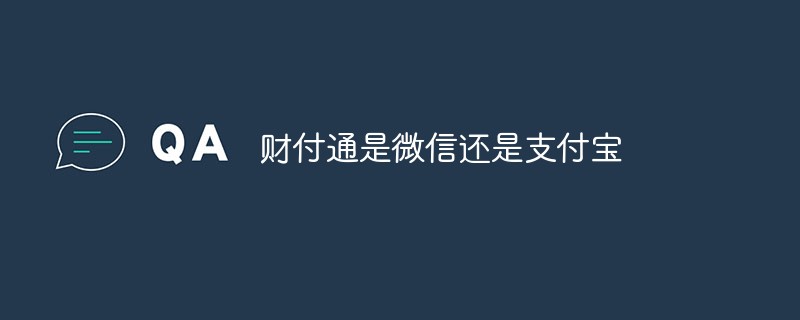 财付通是微信还是支付宝Oct 18, 2022 pm 02:35 PM
财付通是微信还是支付宝Oct 18, 2022 pm 02:35 PM财付通是微信,是腾讯公司旗下的第三方支付平台,其核心业务是协助在互联网上进行交易的双方完成支付和收款,其使用方式是:1、进行账户注册及登录;2、进行账户充值;3、根据需求设置快捷支付;4、通过打开微信支付或QQ钱包查询交易账单。
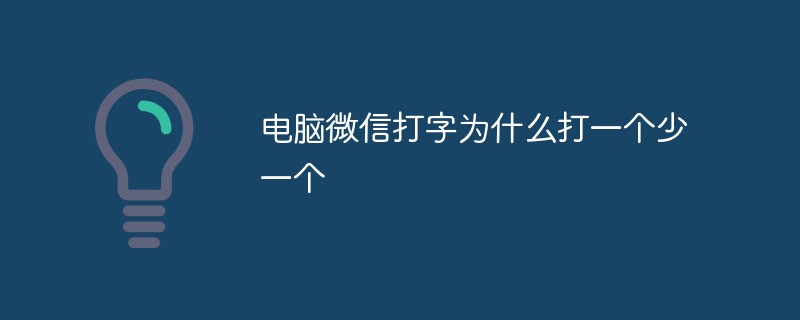 电脑微信打字为什么打一个少一个Mar 28, 2023 pm 03:43 PM
电脑微信打字为什么打一个少一个Mar 28, 2023 pm 03:43 PM电脑微信打字打一个少一个是因为开启了改写状态,其解决办法:1、打开电脑微信;2、在微信聊天窗口输入对话文字内容;3、找到并按下键盘上的Insert键即可正常输入文字内容。


Hot AI Tools

Undresser.AI Undress
AI-powered app for creating realistic nude photos

AI Clothes Remover
Online AI tool for removing clothes from photos.

Undress AI Tool
Undress images for free

Clothoff.io
AI clothes remover

AI Hentai Generator
Generate AI Hentai for free.

Hot Article

Hot Tools

PhpStorm Mac version
The latest (2018.2.1) professional PHP integrated development tool

MantisBT
Mantis is an easy-to-deploy web-based defect tracking tool designed to aid in product defect tracking. It requires PHP, MySQL and a web server. Check out our demo and hosting services.

SublimeText3 Linux new version
SublimeText3 Linux latest version

SecLists
SecLists is the ultimate security tester's companion. It is a collection of various types of lists that are frequently used during security assessments, all in one place. SecLists helps make security testing more efficient and productive by conveniently providing all the lists a security tester might need. List types include usernames, passwords, URLs, fuzzing payloads, sensitive data patterns, web shells, and more. The tester can simply pull this repository onto a new test machine and he will have access to every type of list he needs.

EditPlus Chinese cracked version
Small size, syntax highlighting, does not support code prompt function





